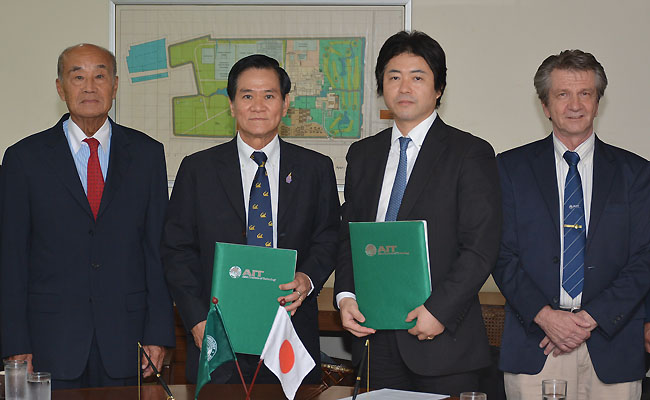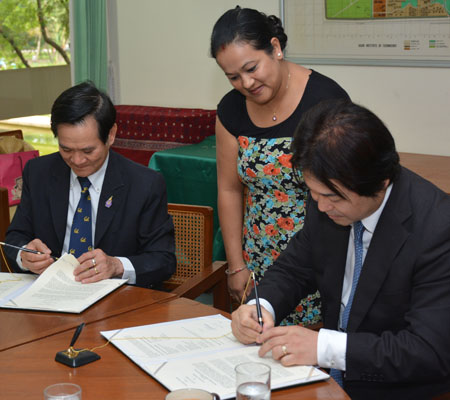signed on 16 July 2015 between AIT and Japanese technology developer
KyI Co., Ltd, could also see the Pathumthani-based institute become the
regional focal point in the high-tech security reform of national
security ID systems, motor vehicle license plates, legal documentation,
and consumer products, officials said.
Both scenarios hinge on AIT’s successful research and development of
KyI Co., Ltd’s existing RFID (radio-frequency identification)
technologies, to support three new ‘Thai Gateway Projects’ aimed at
Thai and Southeast Asian markets.
AIT President Prof. Worsak Kanok-Nukulchai inked the deal with KyI
Co., Ltd. CEO Mr. Masayuki Kobayashi. The partners aim to provide a
modern, secure, and efficient means of documentation communication for
government, education, legal and industrial sectors.
Under the new 'RFID Technology Adaptation of Thai Gateway Projects'
program, this year the AIT Center of Excellence on Nanotechnology
(COEN) will hand over three commercial prototypes to KyI Co., Ltd. In
return for the licensing and technology transfer, AIT will receive a
commission on KyI’s future post-tax revenues.
The direct linkage with industry is seen as a sustainable means of
resource generation for AIT. In addition, KyI will fund academic
scholarships at AIT valued at 2.9 million Thai Baht (THB), to be
earmarked for nanotechnology postgraduate students to study at the COEN
starting in August 2015.
RFID technologies involve authentication, verification, tracking and
tracing, and anti-counterfeit solutions. For the initial ‘Document
Paper Gateway Project,’ COEN scientists will create an RFID system for
all degrees, diplomas and certificates conferred by AIT.
Later, a new RFID tag will be developed using a nano-silver inking
process that is directly integrated into paper materials via
nanotechnology. The technology enhances security and non-cloning
capability and prevents any re-use or forgery, said AIT nanotechnology
expert Dr. Louis Hornyak.
The second prototype involves embedding KyI RFIDs into identification
cards to enhance security and non-cloning of ID cards used by
governments and other agencies, he said. AIT will develop integral RFID
tags within the cards through nanotechnology inking processes.
A third prototype system will integrate new RFID tags and tagging
systems into consumer goods, including modified readers and
server-database systems with expanded capability. Nanotechnology is
involved in developing adhesive materials, enhanced substrates, and
self-destructive tags for use in the product.
Overall, the three-component system involves authorization,
third-party verification, and tracking and tracing ability with
back-end server support. According to Dr. Hornyak, HR departments will
find the technology useful. “It’s like a background check for
academics,” the COEN director said.
The MOA signed at the Asian Institute of Technology was witnessed by
H.E. Dr. Subin Pinkayan, Chairman, AIT Board of Trustees; Dr. John
Nelson, Vice Chairman, AIT Board of Trustees (CEO and Principal
Geotechnical Engineer, Engineering Analytics Inc., USA); Mr. Noritada
Morita, AIT Board of Trustees (Former Asian Development Bank Director);
and Ms. Sujintana Chanyatipsakul, Permanent Secretary, Mekong
Organization for Mankind (MOM).


